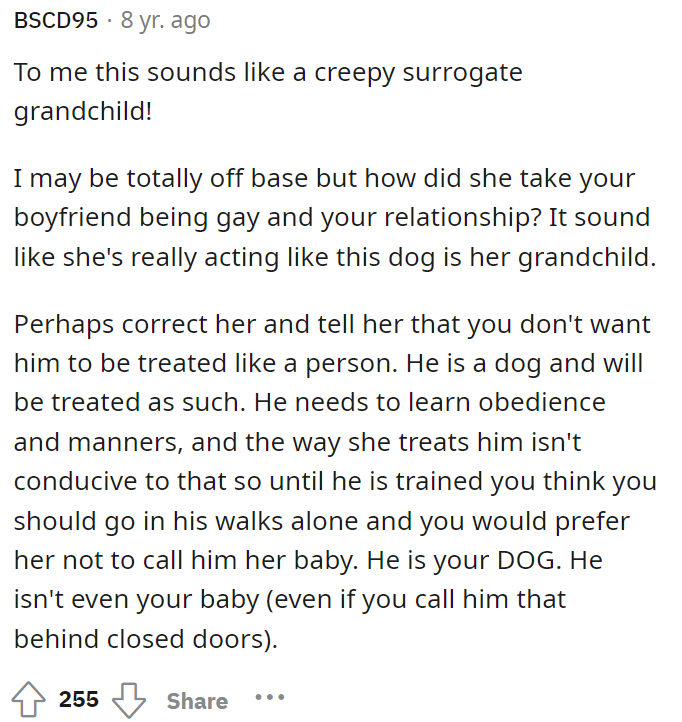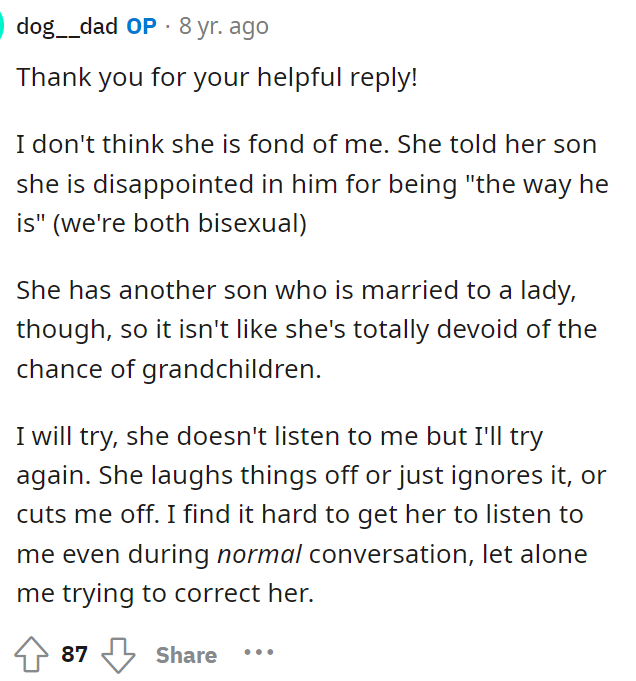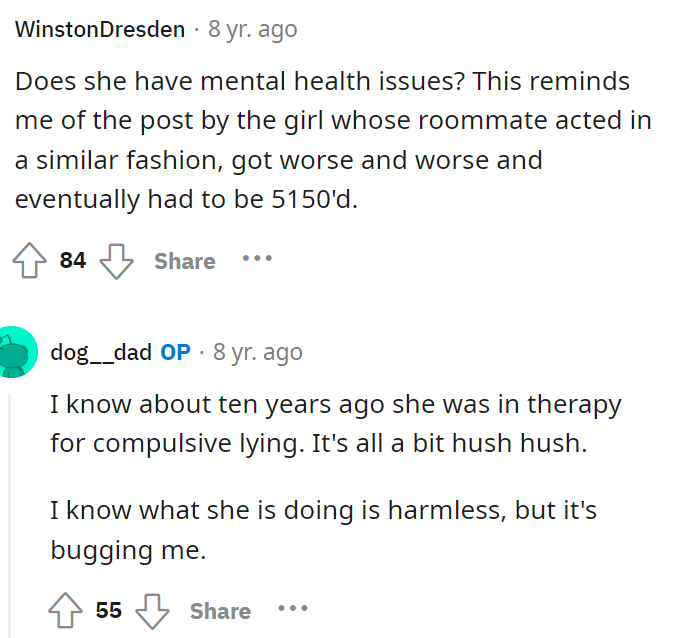Man Is Concerned Over Boyfriend's Mom's Weird Obsessive Behavior Around Their Dog
We're back at it again today with another Reddit post, and this time, it's from the AITA thread. This thread is the perfect place to go if you are looking to get an unbiased opinion or advice on your situation.
We have to admit that a lot of the time, it's best just to get an opinion from someone you don't know rather than asking friends or family who might have a biased perspective. Ultimately, we enjoy looking into these posts because they usually receive a lot of different opinions and responses in the comments, plus the posts themselves are often quite entertaining as well.
With that said, we are examining a post today that was submitted by a guy who is concerned about how his boyfriend's mom is acting toward their dog. He provides details in his post about what exactly is going on, but basically, she seems obsessed with the dog and acts as if it belongs to her instead of to him.
He expresses the situations that have occurred and shares that he just wants to know if this is weird or if he shouldn't be concerned at all. However, people had quite a bit to say in the comments. The whole situation seems a little odd, making it quite peculiar.
Let's take a look at the full post and all the best comments on it.
OP starts off by explaining their situation and who he and his boyfriend are.

He then goes into detail about his partner's mom and how she's been acting toward them.

Then he describes the things she has done and what has been strange about her behavior.

Understanding Obsessive Behaviors in Family Dynamics
Dr. Linda Carter, a clinical psychologist specializing in family dynamics, explains that obsessive behaviors can emerge from underlying anxieties and fears.
This scenario illustrates how an individual’s need for control can manifest in their interactions with family members, particularly regarding pets.
Research indicates that when individuals feel insecure, they may engage in controlling behaviors to cope, which can lead to tension in relationships.
These instances are quite strange, and we definitely don't think that OP is overreacting here.

I would feel very uncomfortable if someone were to act this way with my dog, so I definitely understand why OP thinks this is odd.

I wonder if there might be more to the story and if she has some sort of abandonment issues or something similar.

It's essential to recognize that such behaviors often stem from deeper emotional issues rather than being a direct reflection of the quality of the relationship.
Studies show that addressing the root causes of obsessive behaviors can lead to healthier family dynamics and improved emotional well-being.
Encouraging open communication about feelings and motivations can foster greater understanding among family members.
It honestly seems like the examples are never-ending here.

This is the last instance he mentioned regarding his boyfriend's mom being just strange with their dog.

This could also be a possibility, and maybe that's why she is so focused on the dog. However, it seems that this isn't appropriate.

Navigating Obsessive Behaviors in Relationships
To address obsessive behaviors, it’s crucial for family members to engage in constructive conversations about boundaries and needs.
Research suggests that families who practice empathy and active listening are better equipped to navigate conflicts arising from obsessive behaviors.
Establishing clear boundaries can help create a supportive environment that minimizes misunderstandings.
It sounds like she doesn't really want a dog, then.

It's kind of strange that she's making it seem like she has authority over the dog or that she'll be taking care of him.

OP wants to know if he is overreacting about this situation and is looking for guidance in the comments.

Additionally, seeking professional support, such as family therapy, can provide valuable insights into managing obsessive behaviors within the family unit.
Engaging in therapy can help individuals explore the motivations behind their behaviors and develop healthier coping strategies.
Ultimately, fostering a culture of understanding and support will enhance family relationships and emotional health.
TLDR for everyone who doesn't want to read all of that.

It does sound quite strange that she's acting this way, and it seems like she's really overstepping her boundaries.

OP responded frequently in the comments, thanking everyone for their advice as he navigates this situation.

The Psychological Impact of Control in Family Relationships
This situation highlights the emotional complexities surrounding obsessive behaviors and the need for control in family dynamics.
Experts emphasize that understanding the motivations behind such behaviors is crucial for fostering healthier relationships.
Recognizing these dynamics can help individuals navigate family conflicts with greater empathy and compassion.
This is a pretty important question to ask as well because it could significantly impact why she's acting this way.

People had a lot to say in the comments about the situation and everything that was going on. It seems like there are many factors to consider here, but people do agree that OP is not the antagonist and that it is indeed very strange that she's behaving this way about the dog.
What do you think about the situation?
Psychological Analysis
This situation illustrates the challenges families face when dealing with obsessive behaviors, which often stem from deeper emotional issues.
Encouraging open discussions about feelings and motivations can help families navigate these complexities more effectively, ultimately fostering healthier relationships.
Analysis generated by AI
Analysis & Alternative Approaches
Understanding obsessive behaviors in family dynamics is essential for fostering healthy relationships.
As noted by Dr. Gary Chapman, marriage counselor, "Healthy family relationships require clear communication, empathy, and an understanding of each member's emotional needs." This insight emphasizes the importance of nurturing emotional connections within families to mitigate obsessive behaviors.



